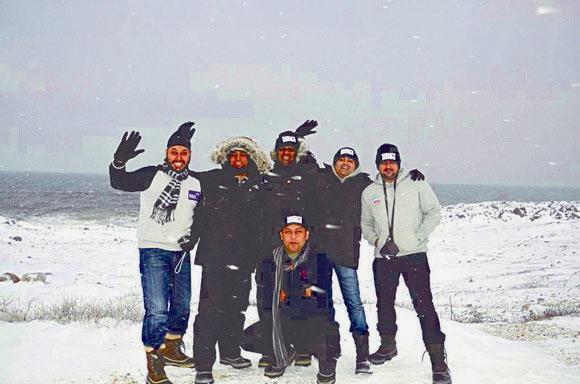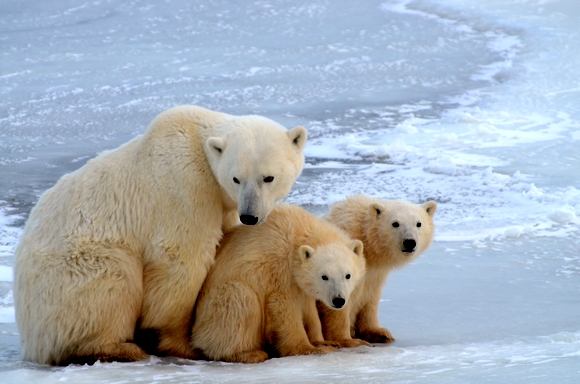 | « Back to article | Print this article |
Indian team wins Arctic challenge
A five-member Indian team was that won competitions organised by London-based company Royal and Sun Alliance insurance and the World Wildlife Fund visited the Arctic to witness the effects of climate change.
A five-member Indian team -- comprising Prashant Singh, Tarandeep Singh Walia, Amit Tewari, Narayan Seshadri and Vivek Kumar -- was among the three winners of competitions organised by London-based company Royal and Sun Alliance insurance and the World Wildlife Fund. The Indian team shared the prize with the teams from Oman and Britain.
The winners were taken on an all expense paid trip to the Arctic to witness the effects of climate change.
"We have done this twice earlier," said RSA spokesperson Julia Oosterman. "We organise a trip called 'Seeing is Believing' with our partners. The objective is for us to understand the impact of global warming. When you go there you see how the waves are coming to the shores, how the ice is disappearing and so how polar bears can't go out to eat. These developments are easy predictors of global warming."
Monique Gordon, public relations associate, Temple Scott Associates, the publicists for the RSA, said over 10,000 RSA employees took part in the challenge which asked the staff to reduce their carbon footprint, donate and raise funds for charity, or come up with ideas to reduce their environmental impact and think of new green initiatives.
The Oman team clocked an impressive 6, 431 miles by walking almost everywhere for seven weeks, while the team from Britain developed a scheme to reduce carbon emission.
The Indian team participated in all three segments and was among the top five in the walking segment.
'To show our winners just how important their green efforts were, the trip to the Arctic gave them a first-hand experience of the very real effects of climate change. While a concept for many, climate change is an everyday reality for some, especially for the Arctic's inhabitants,' the RSA said in a statement.
The three winning teams spent time with experienced WWF Arctic researchers in Churchill, Manitoba, and learnt about how climate change is affecting its people and wildlife species, Gordon said.
"They met the Inuit community in Arviat, to learn about their way of life and how they have adapted to life alongside the Arctic's most famous residents, the polar bears," she said. "Bringing people to the region to see the impact of global warming will create ambassadors who can help to drive the change we need."
Oosterman said the company would organise the global competition again, but she was not sure where the winning teams would be taken. "India could be the next destination, as part of WWF's Save the Tigers campaign," she said.
'In the Arctic we could see how climate change is affecting nature'
Tarandeep Singh Walia, a Delhi-based employee of Royal Sundaram Insurance, who was part of the Indian team that won an all-expense-paid trip to the Arctic, was thrilled at the opportunity.
Walia told India Abroad, "It was altogether a different experience when we landed in the Arctic. Being born and brought up in Delhi, I had never set foot on snow, so naturally it was an amazing feeling."
"Seeing polar bears in their natural habitat from a helicopter was an experience that I can never forget," Walia added.
Back in Delhi, he said he now tells his colleagues, friends and family about climate change. "When we were in the Arctic we saw how climate change is affecting nature. Slabs of ice are melting. Winter, which would start in October, now begins only in November and is becoming shorter every year. The natural habitat of polar bears is fast perishing and their existence is endangered," Walia said.
He said he had taken some small steps to help the environment and preserve it for future generations. "I walk most of the time when I go shopping with my mother or my son. I take the stairs in the office or the shopping malls. I don't use plastic bags any more."

